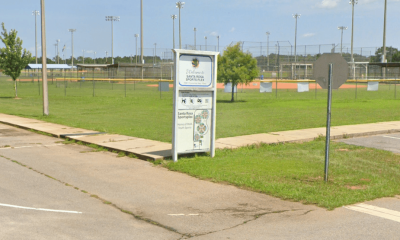Yakima residents want to keep the Harman Center and maintain spending on police.
That was the message from a community survey and town hall meetings this spring as the Yakima City Council considers how to tackle next year’s budget. The city faces an impending $9 million shortfall in its 2026 general fund.
Council members didn’t make any budget decisions at their Tuesday meeting, but they reviewed data from outreach efforts and a new budget committee’s work after approving several zoning ordinances.
Budget stays in focus
Council members balanced this year’s budget by reducing reserves and making small cost-cutting measures.
Next year’s budget will be stickier, particularly involving the general fund, which pays for a variety of services, including police, fire, and parks and recreation. The general fund is projected to have around $76 million in revenue and $85 million in expenditures.
The city has other funds – separate pots of money – designated for everything from waste and refuse services to debt service to capital projects and construction.
The city’s total budget next year is projected to be around $287 million in revenue and $286 million in expenditures, but that total budget often fluctuates based on construction and infrastructure projects which receive a combination of loan and grant funding.
City council members have focused on getting community feedback this year as part of a new priority-based budgeting process. Tuesday, a new finance and budget director was introduced to oversee that effort – Craig Warner, who formerly held a similar position for Yakima County before retiring earlier this year.
Feedback from surveys, meetings
The expected shortfall prompted the city to survey community members and hold town hall meetings to get feedback.
City Manager Vicki Baker led the town halls and has met with community groups and nonprofits to share information about the budget.
One takeaway from those feedback efforts was support for the Harman Senior Center near Summitview Avenue. Baker said more than 100 participants showed up to a budget presentation there and urged council members to keep the center open.
In the city’s budget survey, closing the Harman Senior Center was supported by just 18% of respondents. Council members, including Janice Deccio, Matt Brown, Rick Glenn and Reedy Berg said they wanted to keep the center open.
One idea is to increase fees charged by the center’s users.
Baker said a budget presentation at the Yakima Convention Center showed an interest in keeping youth programs and gang intervention work. Another at Davis High School centered on economic development as a way to increase city revenues in the long term.
Baker presented a budget survey that was filled out by more than 2,000 people, mostly from the western portion of Yakima.
The survey asked about peoples’ priorities for public spending, what they might be willing to cut and how they felt about property tax increases.
Police received the most votes as a priority – with 40% naming it their top priority. Street maintenance and infrastructure and parks, pools, community centers and sports programs received 26% and 25% of votes as a top priority. Fire services were at 9%.
There was support from survey respondents to increase property taxes to support police, the fire department and courts – up to 57% of respondents voted for that option in one question.
More than 50% of respondents supported eliminating three general fund expenditures when asked: lobbying and council member travel, fireworks and the Windows Alive! Project.
Respondents indicated they wanted to keep YPD units focused on gangs and narcotics. They also supported youth sports programs, the Harman Center and Franklin Pool.
Brown pointed out that many of the expenditures with broad support for elimination had low costs.
“A lot of the ones that are easy to cut, they don’t equate to a lot of money,” he said.
Glenn said some cuts, like to lobbyists, could leave the city without advocates who push for greater funding from outside sources, like the state government.
Brown and Mike Bailey, the outgoing interim finance and budget director, both discussed finding increased efficiencies and streamlining services.
Bailey presented on the new finance and budget committee’s work. City council members each appointed a member of a new committee to study the budget and propose solutions to budget issues.
Bailey said the committee was still trying to find common ground discussing those budget issues.
“The committee’s work is going to continue for at least a few more weeks as they work to come to a consensus,” he said.
Bailey said committee members had learned about state law and budget constraints and spoken with city officials.
They had discussed ways of increasing revenue, including higher charges to non-residents or neighboring communities for services or increasing sales or property taxes.
Jeanna Hernandez, a member of the committee, said it needed more time to present agreed upon recommendations with a solid rationale. Another member, Gunnar Berg, briefly presented his own ideas after serving on the committee.
Other news
Council members unanimously approved two zoning ordinances.
• City council members approved changes to requirements for land-use permits. The changes will require less time and paperwork for some land use permits in various types of zones, including for bakeries and congregate living facilities. Reviews of short-term rentals and auto dealership applications will have more steps.
• Another zoning update will make it easier for new businesses to take over an existing storefront. If a new business moves into a building without changing how it is used, there will be fewer steps to get city approval.




































 Basketball Camp (grades K-8th grade) June 16-19 Your athlete will receive quality time to learn fundamentals – dribble, shoot, free throw – and improve existing skills in a fun, engaging, and challenging setting. This is a fast-paced camp that promises dedicated time to experience the fun of sports and working as a team.
Basketball Camp (grades K-8th grade) June 16-19 Your athlete will receive quality time to learn fundamentals – dribble, shoot, free throw – and improve existing skills in a fun, engaging, and challenging setting. This is a fast-paced camp that promises dedicated time to experience the fun of sports and working as a team. Flag Football Camp (grades 1st to 8th) June 23-26 teaches the basics of passing, catching, running plays, and more advanced techniques in a team-oriented environment. We will provide instruction on rules, fundamentals, and safety procedures. Flag Football is one of the most popular up-and-coming sports that anyone can play and is so much fun.
Flag Football Camp (grades 1st to 8th) June 23-26 teaches the basics of passing, catching, running plays, and more advanced techniques in a team-oriented environment. We will provide instruction on rules, fundamentals, and safety procedures. Flag Football is one of the most popular up-and-coming sports that anyone can play and is so much fun. Soccer Camp (K – 8th grade) July 14-17 instructs young athletes on soccer basics (dribbling, passing, shooting, defending), build skills, and improve endurance through age-appropriate drills and gameplay. Sportsmanship and communication are enhanced in a positive environment built on working as a team.
Soccer Camp (K – 8th grade) July 14-17 instructs young athletes on soccer basics (dribbling, passing, shooting, defending), build skills, and improve endurance through age-appropriate drills and gameplay. Sportsmanship and communication are enhanced in a positive environment built on working as a team.





















 | First Take
| First Take

























